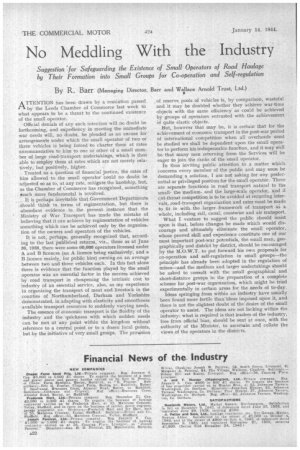No Meddling With the Industry
Page 24

If you've noticed an error in this article please click here to report it so we can fix it.
Suggestion for Safeguarding the Existence of Small Operators of Road Haulage by Their Formation into Small Groups for Co-operation and Self-regulation
By R. Barr (Managing Director, Barr and Wallace Arnold Trust, Ltd.) • ATTENATTENTION has been drawn by a resolution passed TION the Leeds Chamber of Commerce last week to what appears to be a threat to the continued existence of the small operator.
Official denials of any such intention will no doubt be forthcoming, and expediency in meeting the immediate war needs will, no doubt, be pleaded as an excuse for arrangements under which the small operator of two or three vehicles is being forced .to charter them at rates unremunerative to him to one or other of a small number of large road-transport undertakings, which is then able to employ them at rates which are not merely relatively, but positively, higher.
Treated as a question of financial justice, the rates of hire allowed to the small operator could no doubt be adjusted so as to, at any rate, mitigate the hardship, but, as the Chamber of Commerce has recognized, something much more fundamental is involved.
It is perhaps inevitable that Government Departments should think in terms of regimentation, but there is abundant evidence in the present instance that the Ministry of War Transport has made the mistake of believing that it can achieve by regimentation of vehicles something which can be achieved only by the organization of the owners and operators of the vehicles.
It is not, perhaps, generally recognized that, according to the last published returns, viz., those as at June 30, 1938, there were some 60,000 operators licensed under A and B licences (an A licence being exclusiVely, and a
B licence mainly, for public hire) owning.on an average between two and three vehicles each. In this fact alone there is evidence that the function played by the small operator was an essential factor in the success achieved by road transport in cheapening the intrinsic cost to industry of an essential service, also, as my experience in organizing the transport of meat and livestock in the counties of Northumberland, Durham and Yorkshire demonstrated, in adapting with elasticity and smoothness available transport resources to suddenly varying needs.
The essence of economic transport is the fluidity of the industry and the quickness with which sudden needs can be met at any point within the kingdom without reference to a central point or to a dozen focal points, but by the initiative of very .sniall groups. The prolUsion s of reserve pools of vehicles is, by comparison, wasteful and it may be doubted whether they achieve war-time objects with the same efficiency as could be achieved by groups of operators entrusted with the achievement of quite elastic objects.
But, however that may be, it is certain that for the achievement of economic transport in the post-war period of international competition when all overheads must be studied we shall be dependent upon the small operator to perform his indispensable function, and it may well be that many men returning from the Services will be eager to join the ranks of the small operator.
In thus inviting public attention to a matter which concerns every member of the public and may soon be demanding a solution, I am not asking for any preferential or privileged position for the small operator. There are separate functions in road transport natural to the smallthe Mediumand the large-scale operator, and if cut-throat competition is to be avoided at recurring intervals, road-transport organization and rates must be made to fit in with the larger framework of transport as a whole, including rail, canal, coastwise and air trahsport.
What I venture to suggest the public should insist upon is that, before changes be made which would discourage and ultimately eliminate the small operator, whose proved skill and experience constitute o'ne of our most important post-war potentials, the small man, geographically and district by district, should be encouraged by the M.O.W.T. to put forward his own proposals for co-operation and self-regulation in small groups—the principle has already been adopted in the regulation of mines—and the medium and larger undertakings should be asked to consult with the small geographical and short-distance groups in the preparation of a complete scheme for post-war organization, which might be tried experimentally in certain areas for the needs of to-day.
Ideas springing from within an industry have usually been found more fertile than'ideas imposed upon it, and there is not the slightest doubt of the desire of the small operator to assist. The ideasare not lacking within the industry; what is required is that leaders of the industry, free from official bias, should be sent at once, with the authority of the Minister, to ascertain and collate the views of the operators in the districts.




















































